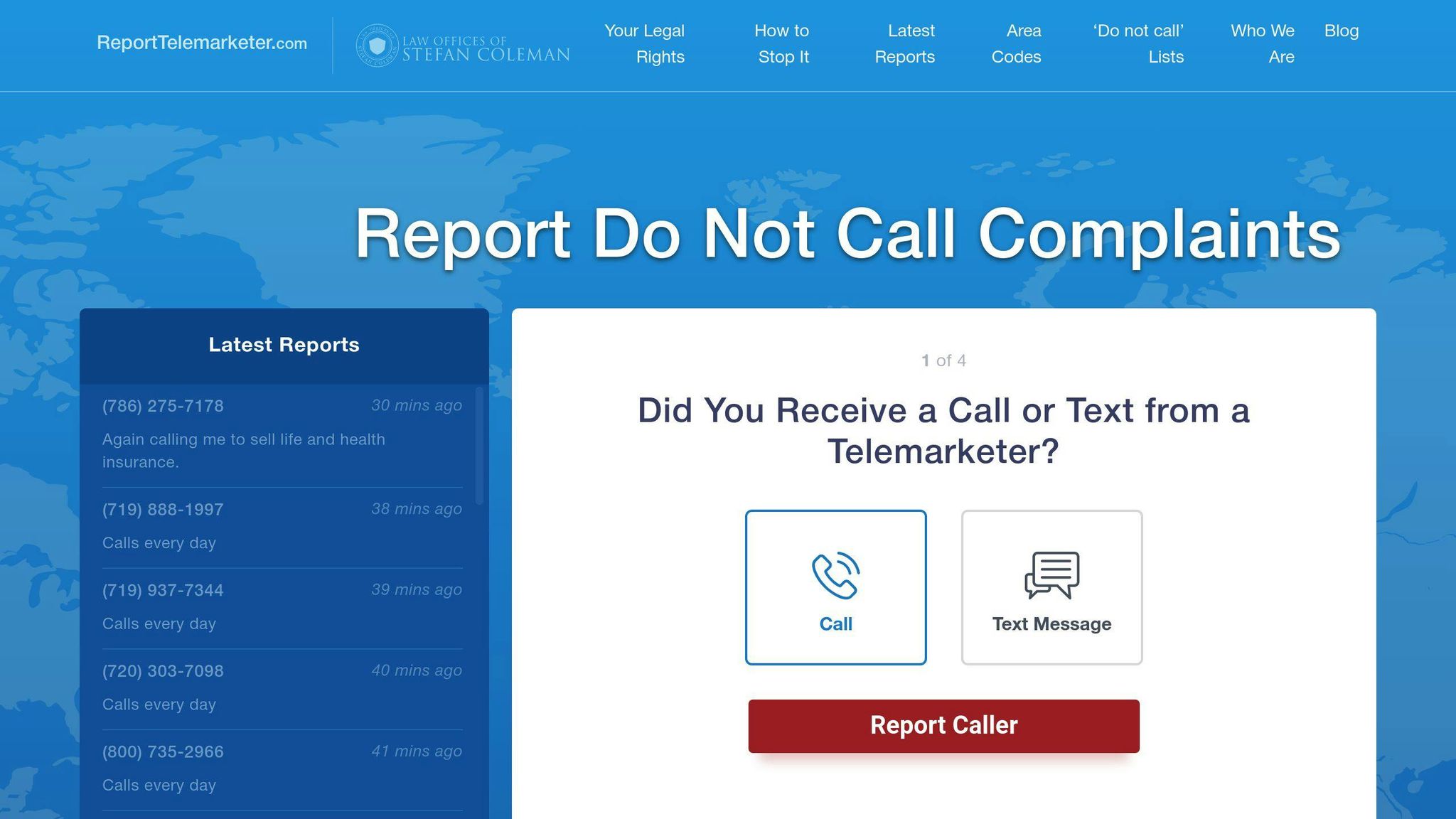
Telemarketing scams trick people into losing money or sharing personal information. These scams often involve fake representatives, urgent demands, or too-good-to-be-true offers. Here’s how to protect yourself:
- Fake Representatives: Scammers pretend to be from trusted companies or agencies like banks, the IRS, or Social Security.
- Debt Relief Scams: They promise to fix credit or eliminate debt but demand upfront payments.
- Charity Scams: Fraudsters mimic real charities, especially during emergencies or holidays.
- Tech Support Scams: Fake support calls claim your computer has issues and steal your data.
- Foreign Lottery Scams: They claim you’ve won a lottery but ask for fees upfront.
Quick Tips to Stay Safe:
- Verify callers by contacting companies directly.
- Don’t share personal or financial information over the phone.
- Use call-blocking tools and the National Do Not Call Registry.
- Report suspicious calls to the FTC or FCC.
Scammers rely on pressure tactics and urgency – stay cautious and take your time to verify claims.
10 Types of Telemarketing Scams to Watch For
1. Scams Involving Fake Representatives
In these scams, fraudsters pretend to be from trusted organizations like Chase, American Express, the IRS, or the Social Security Administration. They often create a sense of urgency, claiming issues like unpaid fees or security problems with your account.
The Federal Trade Commission points out that these callers use aggressive tactics and push for immediate action. They might already have some of your personal details, making their claims seem believable. A major warning sign is when they demand payment or sensitive information over the phone.
While these scams rely on trust, others target financial struggles, such as fraudulent debt relief schemes.
2. Debt and Credit Repair Scams
These scams target individuals dealing with financial challenges, offering fake solutions like quick credit fixes or debt elimination. They exploit vulnerable situations to appear helpful.
| Warning Signs | What to Watch For |
|---|---|
| Payment Upfront | Requests payment before showing proof of services |
| Unrealistic Guarantees | Promises of instant credit score improvements |
| High-Pressure Sales | Urges you to sign contracts without time to review |
3. Fake Business and Investment Offers
Scammers lure victims with promises of guaranteed returns and "exclusive" opportunities. These offers often sound too good to be true. The FTC reminds consumers that legitimate investments always include clear details about risks.
4. Charity Donation Scams
These scams often appear during emergencies or holidays, preying on people’s generosity. Fraudsters mimic legitimate charities, sometimes using names that closely resemble well-known organizations to trick donors.
In addition to charity scams, fraudsters also use fake prize or reward offers to deceive unsuspecting individuals.
5. Car Warranty Scams
Scammers claim your car warranty is about to expire, offering to extend it. They may use basic details about your vehicle to sound convincing. These calls usually start with automated messages, followed by pushy sales reps. The FTC advises that real warranty providers won’t contact you out of the blue.
6. Foreign Lottery and Prize Scams
These scams inform victims of a fake lottery win but demand upfront fees for "processing" or "taxes." The FTC stresses that legitimate lotteries never ask for payment to claim a prize. Foreign lotteries are often involved, making it harder to verify their authenticity.
7. Vacation and Travel Scams
Travel scammers offer trips that seem free or heavily discounted but come with hidden costs. They pressure you to act fast, citing limited availability. These deals often include unexpected fees or restrictions.
8. Fake Tech Support Calls
Scammers posing as Microsoft or Apple representatives claim they’ve detected issues with your computer. They ask for remote access to "fix" the problem but instead steal sensitive data or charge for bogus services.
9. Government Grant Scams
These scams claim you’ve been approved for free government money but require a processing fee to release it. The callers use pressure tactics to rush you into agreeing.
"Telemarketing scammers try not to give you the time to think about their pitch, but just want to get you to say ‘yes’".
How to Stay Safe from Telemarketing Scams
Confirm Who Is Calling
Caller ID isn’t always reliable. Scammers often use spoofing to fake phone numbers. If someone claims they’re from a company you know, hang up and call the company directly using the official number from your statement or their website. For instance, if someone says they’re from Chase Bank, end the call and dial the number on the back of your Chase card instead.
Avoid High-Pressure Sales Tactics
Legitimate businesses won’t rush you into decisions. Be cautious of anyone using aggressive tactics to push you into acting quickly.
| Warning Signs | How to Respond |
|---|---|
| Urgency to act or pay immediately | Ask for written details |
| "Limited time" offers | Take time to verify |
| Claims of exclusive selection | Check with official sources |
| Persistent high-pressure tactics | Hang up if uncomfortable |
Use Call Blocking and Do Not Call Lists
Add your number to the National Do Not Call Registry (donotcall.gov) and enable call-blocking features provided by your phone or carrier. While this won’t stop every unwanted call, it can reduce legitimate telemarketing calls.
Keep Personal Information Private
Don’t share sensitive details like Social Security numbers, bank account info, or Medicare details over the phone. Companies you already work with won’t ask for this information through unsolicited calls.
Even when you’re cautious, scammers may still try to exploit your trust or generosity.
Research Before Donating or Committing
Take the time to verify organizations before donating or agreeing to anything. Use resources like the Better Business Bureau, state charity regulators, or online searches to check for complaints or scams.
Report Suspicious Calls
If you suspect a scam, report it to the FTC, FCC, your state attorney general, or platforms like ReportTelemarketer.com. Reporting these calls helps protect others and aids authorities in fighting telemarketing fraud.
sbb-itb-a8d93e1
Resources to Help Fight Telemarketing Scams
Use ReportTelemarketer.com

ReportTelemarketer.com is a free service designed to help you tackle unwanted telemarketing calls and texts. The platform investigates telemarketers and checks for violations of consumer protection laws – all at no cost to users.
| Service Feature | What It Does |
|---|---|
| Investigation Tools | Tracks and identifies scammers |
| Legal Action | Helps file legal complaints |
| Cost Recovery | Assists in recovering losses |
| Privacy Protection | Keeps your personal info secure |
Learn About Consumer Rights
Take advantage of these resources to stay informed and safeguard yourself from telemarketing scams:
- FTC Portal: Submit complaints at ftc.gov/complaints or call 1-877-FTC-HELP (1-877-382-4357).
- FCC Portal: File complaints at fcc.gov or call 1-888-CALL-FCC (1-888-225-5322).
- Better Business Bureau: Research businesses or report scams at bbb.org.
The National Consumer League (NCL) also provides guides on recognizing scams and avoiding them. For help tailored to your state, reach out to your Attorney General’s office for local consumer protection resources.
Understanding Telemarketing Fraud: Stay Safe and Informed
Summary and Final Tips
Phone scams rob consumers of millions each year, but a few simple actions can go a long way in keeping you safe. Whether it’s fake tech support, charity scams, or other fraudulent schemes, following proven strategies can help you avoid falling victim.
Here’s a quick guide to staying safe:
| Protection Strategy | Steps to Take | What It Prevents |
|---|---|---|
| Verify Caller Identity | Confirm callers through official sources; never share personal info | Stops identity theft and fraud |
| Protect Your Money | Avoid sending money or sharing account details over the phone | Prevents financial losses |
| Block Unwanted Calls | Use call-blocking apps and register with the Do Not Call list | Cuts down on scam calls |
"If the person on the phone is using pressure tactics to get you to say yes right away, most likely it’s a scam".
Scammers often rush you into decisions or push for unusual payment methods. Legitimate businesses, on the other hand, allow time for decision-making and stick to standard payment practices. Tools like ReportTelemarketer.com can help you track scams and potentially recover losses. Additionally, report any suspicious calls to the FTC or FCC with all relevant details.
Keep an eye on updates from consumer protection agencies to stay informed about emerging scams. By staying alert and using available resources, you can protect both your money and personal information.